5713 Japanese Residents and 241 Japanese Companies in Belgium (No.50)
Every year on October 1st the Embassy of Japan conducts a survey on Japanese companies in Belgium and last year’s results were recently summarized. According to these survey results, the number of Japanese companies was 241, which is a decrease with 18 companies compared to October 2012. Since the Lehman shock in 2008 the number of Japanese companies tends to decrease gradually every year and last year’s results seem to confirm that trend. The number of Japanese residents, surveyed at the same time, was 5.713 last year which is an increase with 36 residents compared to 2012. In order to understand this difference, one needs to understand in detail the dynamics of Japanese companies. First of all, as to the details of the decrease by 18 companies, there was an increase by 5 companies and a decrease by 23 companies, which means that more than half of the decrease (13 companies) consists of companies that left Belgium. However, as a result of mergers of companies that were spin-offs or separate corporations, the number of companies was reduced in 6 cases in spite of the fact that in reality there is no change. These surveys are conducted by the Consular Section of the Embassy, but to be honest, there is no obligation to report to the Embassy when a Japanese company starts activities in Belgium, which means that it is difficult to have an accurate understanding of the actual situation. As Japanese residents in Belgium are requested to submit a residence report to the Embassy, we can specify to some extent the company names where they are working based on these reports, but in case we are not notified or in case of Japanese companies that have no Japanese expatriates in place, some data might be omitted. In that sense, I cannot say that this time’s survey results are perfect, but they do reflect the actual situation approximately. To all Japanese residents and to all Japanese companies, I count on you to submit the residence report to the Embassy and thank you for your continuous collaboration to our survey.
<Tessenderlo Group and Mitsubishi Chemical>
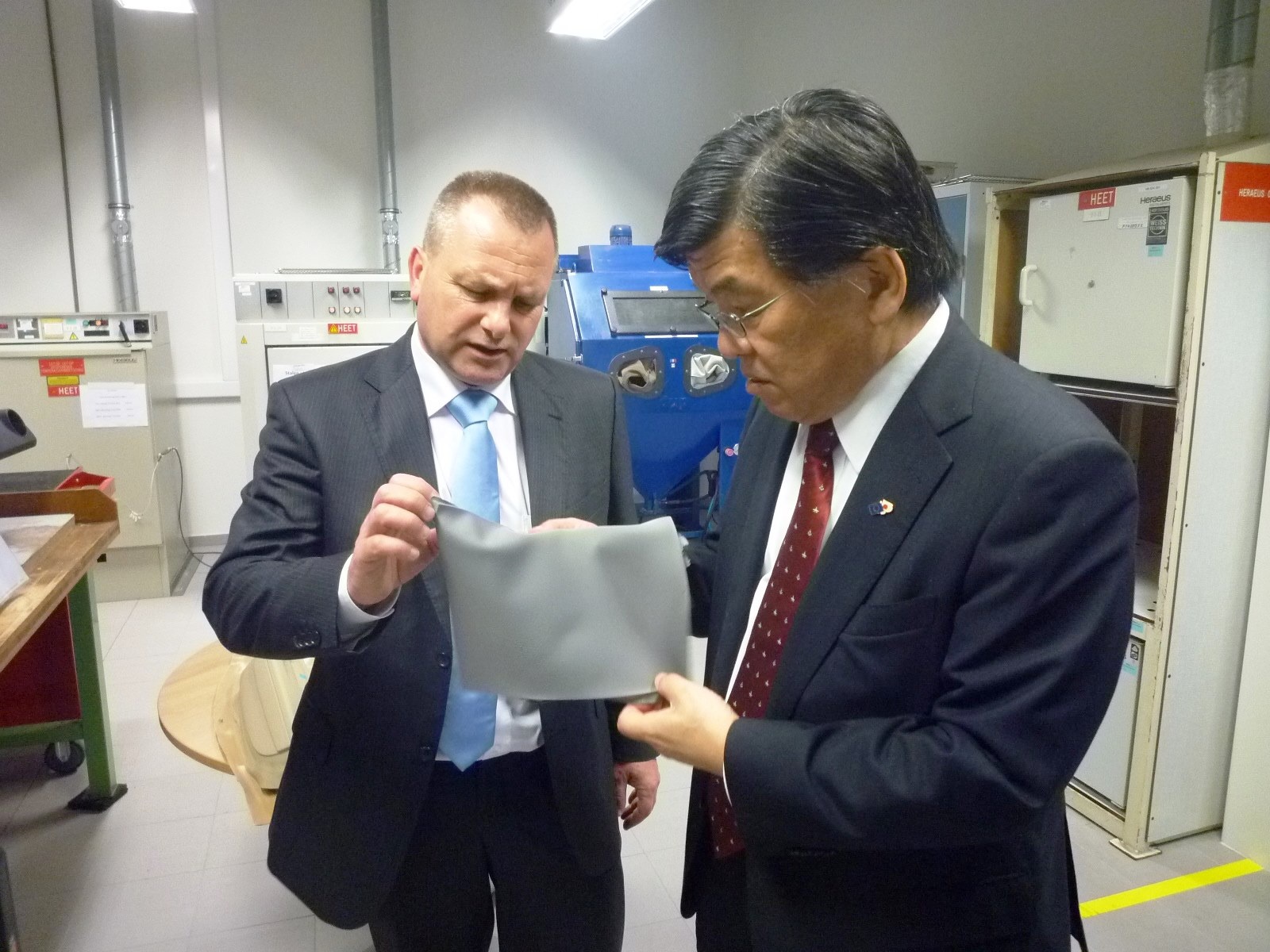 About two weeks ago I visited Mitsubishi Chemical’s R&D Competence Centre (14 employees) in Hasselt (73.000 inhabitants), about 80km northeast of Brussels. Mitsubishi Chemical acquired last June the performance polymers production division from Tessenderlo Chemical Group, a leading chemical company in Belgium. The R&D Competence Centre in Hasselt is also part of that division and belongs currently to MCPP Europe (headquarters in the Netherlands: 300 employees). In its factory on the outskirts of Nantes in France, MCPP is manufacturing a chemical powder called “slush compound”, which is the raw material used for dashboard skins (artificial leather) of cars. The R&D Centre in Hasselt plays an active role in this research. About two weeks ago I visited Mitsubishi Chemical’s R&D Competence Centre (14 employees) in Hasselt (73.000 inhabitants), about 80km northeast of Brussels. Mitsubishi Chemical acquired last June the performance polymers production division from Tessenderlo Chemical Group, a leading chemical company in Belgium. The R&D Competence Centre in Hasselt is also part of that division and belongs currently to MCPP Europe (headquarters in the Netherlands: 300 employees). In its factory on the outskirts of Nantes in France, MCPP is manufacturing a chemical powder called “slush compound”, which is the raw material used for dashboard skins (artificial leather) of cars. The R&D Centre in Hasselt plays an active role in this research.
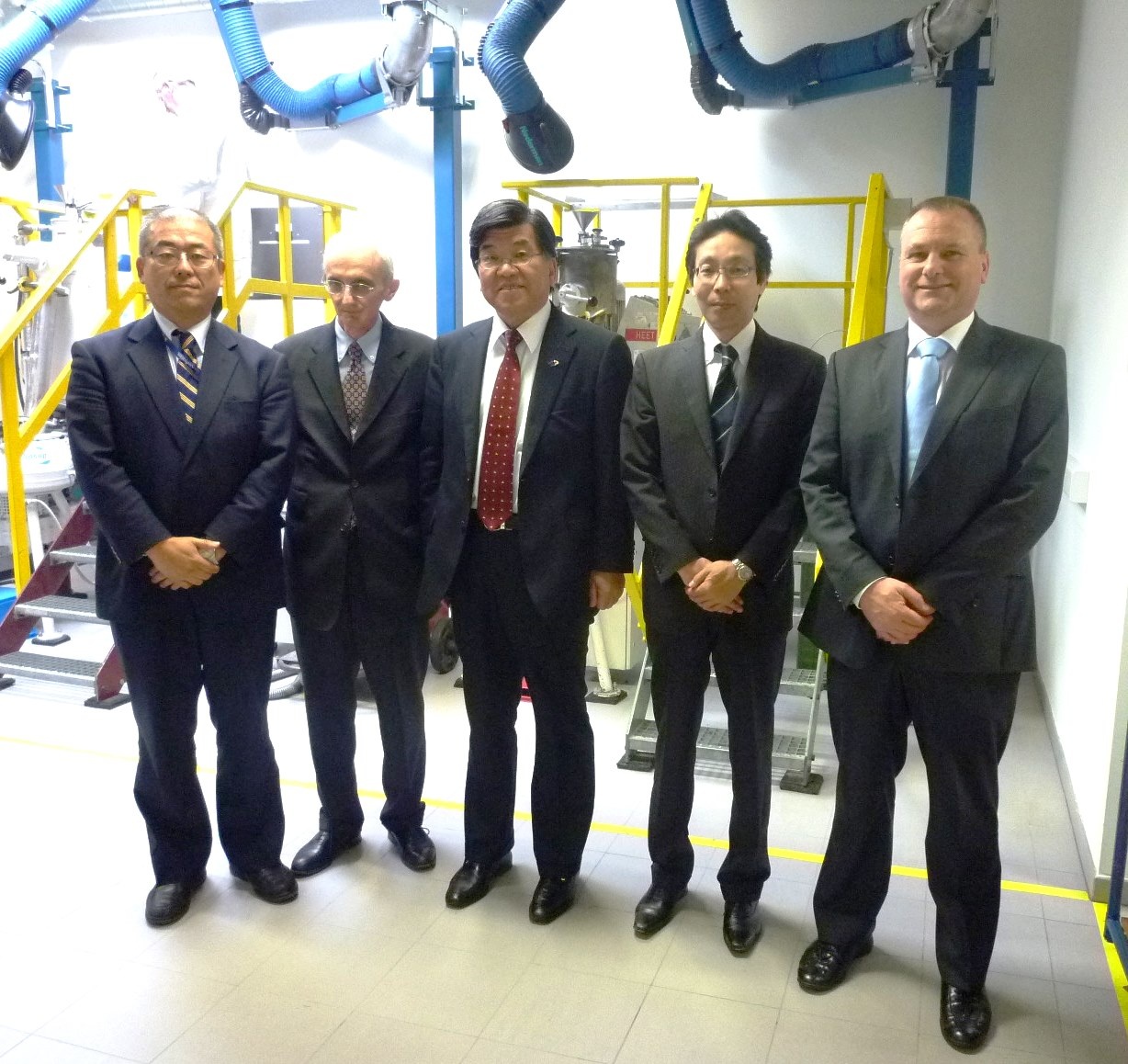 The market share of this chemical exceeds 45% in the European market: many European car manufactures are using MCPP Europe’s “slush compound” for the production of dashboards for their upper and middle class car models. The parent company, Mitsubishi Chemical Holdings, employs 54.000 people worldwide and is a large company with annual sales of more than EUR 22 billions, but the company mapped out a strategy to expand the production of performance polymers in Europe. Tessenderlo Chemical Group wanted to sell its non-core performance polymers business to focus more on fine chemicals, which led to the acquisition by Mitsubishi Chemical last year. The result was a win-win deal for both companies. This kind of investment by Japanese companies in Belgium might thus be possible in other sectors too. The market share of this chemical exceeds 45% in the European market: many European car manufactures are using MCPP Europe’s “slush compound” for the production of dashboards for their upper and middle class car models. The parent company, Mitsubishi Chemical Holdings, employs 54.000 people worldwide and is a large company with annual sales of more than EUR 22 billions, but the company mapped out a strategy to expand the production of performance polymers in Europe. Tessenderlo Chemical Group wanted to sell its non-core performance polymers business to focus more on fine chemicals, which led to the acquisition by Mitsubishi Chemical last year. The result was a win-win deal for both companies. This kind of investment by Japanese companies in Belgium might thus be possible in other sectors too.
<Osaka University and University of Antwerp>
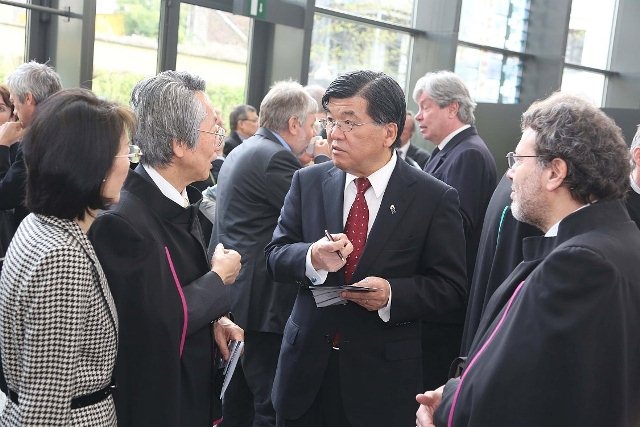 At the beginning of this month, I was delighted to attend the award ceremony of an honorary doctorate to a Japanese scholar at the University of Antwerp, a university that has a relatively weak relationship with Japan among Belgium’s major universities. It was Professor Haruo Sugiyama of the University of Osaka that received the honorary doctorate. Professor Sugiyama is a leading researcher in the field of leukaemia and cancer treatment vaccines in Japan and for many years he has been collaborating with the Faculty of Medicine of the University of Antwerp. yomoyama_050_university2 At the beginning of this month, I was delighted to attend the award ceremony of an honorary doctorate to a Japanese scholar at the University of Antwerp, a university that has a relatively weak relationship with Japan among Belgium’s major universities. It was Professor Haruo Sugiyama of the University of Osaka that received the honorary doctorate. Professor Sugiyama is a leading researcher in the field of leukaemia and cancer treatment vaccines in Japan and for many years he has been collaborating with the Faculty of Medicine of the University of Antwerp. yomoyama_050_university2
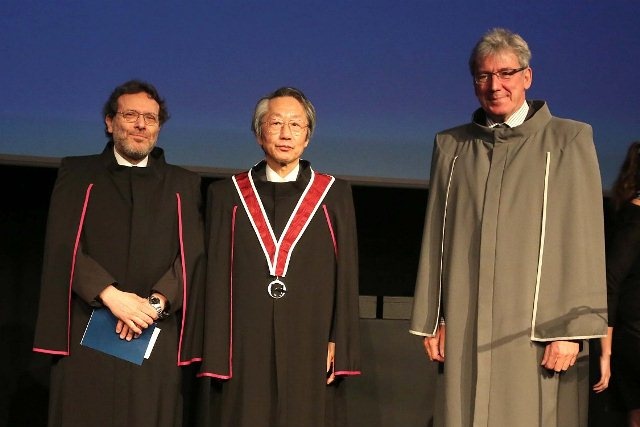 yomoyama_050_university2A laudatio was given at the ceremony by research partner Professor Berneman and the honorary doctorate’s certificate was conferred by Rector Alain Verschoren. That day an American and a British scholar received an honorary doctorate in the field of the humanities and economics, but in the medical field Professor Sugiyama was the only one to receive an honorary degree. The cancer treatment researched by Professor Sugiyama is ground-breaking: nearly 80% of the cancers can be treated by binding amino acids taken from protein and injecting these into the body of cancer patients to enhance the immune function. By the way, the 64-year old Professor Sugiyama was born in the same year and month as me with only 2 days difference. Although our hometowns are not the same, I am very pleased that a scholar of the same school year is playing such an active role internationally. yomoyama_050_university2A laudatio was given at the ceremony by research partner Professor Berneman and the honorary doctorate’s certificate was conferred by Rector Alain Verschoren. That day an American and a British scholar received an honorary doctorate in the field of the humanities and economics, but in the medical field Professor Sugiyama was the only one to receive an honorary degree. The cancer treatment researched by Professor Sugiyama is ground-breaking: nearly 80% of the cancers can be treated by binding amino acids taken from protein and injecting these into the body of cancer patients to enhance the immune function. By the way, the 64-year old Professor Sugiyama was born in the same year and month as me with only 2 days difference. Although our hometowns are not the same, I am very pleased that a scholar of the same school year is playing such an active role internationally.
<European Karate Championships in Kortrijk>
 In the weekend two weeks ago, the European Karate Championships were held in Kortrijk (90km to the west of Brussels; 75.000 inhabitants). I attended the awards ceremony upon invitation from the organizers. The brand new sports campus was packed with Belgian karate fans and the venue was buzzing with Belgian karateka action. I awarded the prize shields and medals to the winners in the team competition of the juniors (boys and girls) and to the winners in the individual men’s competition. yomoyama_050_karate2There are close to 500 karate clubs nationwide in Belgium with 22.000 members. In the weekend two weeks ago, the European Karate Championships were held in Kortrijk (90km to the west of Brussels; 75.000 inhabitants). I attended the awards ceremony upon invitation from the organizers. The brand new sports campus was packed with Belgian karate fans and the venue was buzzing with Belgian karateka action. I awarded the prize shields and medals to the winners in the team competition of the juniors (boys and girls) and to the winners in the individual men’s competition. yomoyama_050_karate2There are close to 500 karate clubs nationwide in Belgium with 22.000 members. 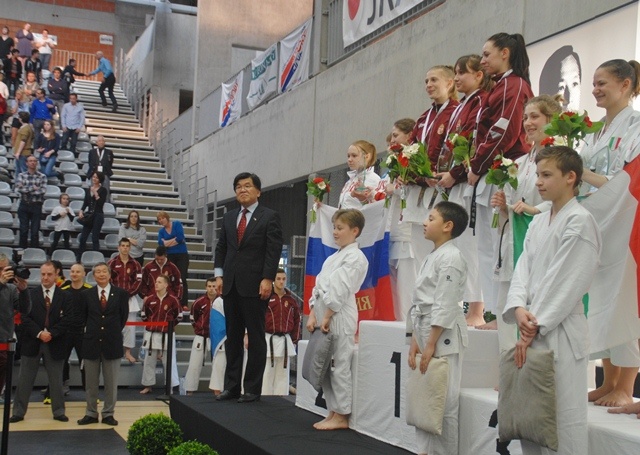 Although in Europe countries such as Germany, France and Italy seem to be strong, in this European Championship with 22 participating countries, the Belgian athletes finished in the top of each division, making the best of the home advantage. The organizer is “JKA Belgium”. JKA stands for Japan Karate Association and the European karate organizations seem to be branches of the Japan Karate Association. According to Philippe Wattieaux, President of JKA Belgium, the three letters JKA hold a very special, almost mystical meaning for a karateka. It is understood as a synonym for the “original, traditional martial art”. I met Japanese karateka who has been coaching Belgians over the past 30 years and realized that thanks to such passionate Japanese, the Japanese martial arts spread throughout the world. Although in Europe countries such as Germany, France and Italy seem to be strong, in this European Championship with 22 participating countries, the Belgian athletes finished in the top of each division, making the best of the home advantage. The organizer is “JKA Belgium”. JKA stands for Japan Karate Association and the European karate organizations seem to be branches of the Japan Karate Association. According to Philippe Wattieaux, President of JKA Belgium, the three letters JKA hold a very special, almost mystical meaning for a karateka. It is understood as a synonym for the “original, traditional martial art”. I met Japanese karateka who has been coaching Belgians over the past 30 years and realized that thanks to such passionate Japanese, the Japanese martial arts spread throughout the world.
<My Thoughts at Attending Two Entrance Ceremonies>
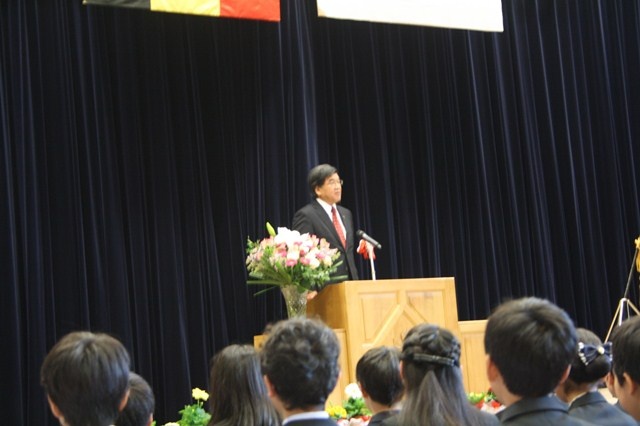 In April, in the season when the cherry blossoms are in full bloom, an entrance ceremony takes place in all schools in Japan. In the Japanese School of Brussels as well, entrance ceremonies were held at the beginning of this month in elementary and middle school level of the full-time and Saturday school. I attended as one of the guests, just like I did last year. The first entrance ceremony was the one for the Saturday school: this year 43 students at elementary school level and 23 students at middle school level (last year, 39 and 15 respectively) were enrolled. This is a higher number of enrolments than usual and 43 pupils in the elementary level in particular seem to be a record number. It brings the total number of students (for language and mathematics every Saturday) to 229, which is also an all time high. In April, in the season when the cherry blossoms are in full bloom, an entrance ceremony takes place in all schools in Japan. In the Japanese School of Brussels as well, entrance ceremonies were held at the beginning of this month in elementary and middle school level of the full-time and Saturday school. I attended as one of the guests, just like I did last year. The first entrance ceremony was the one for the Saturday school: this year 43 students at elementary school level and 23 students at middle school level (last year, 39 and 15 respectively) were enrolled. This is a higher number of enrolments than usual and 43 pupils in the elementary level in particular seem to be a record number. It brings the total number of students (for language and mathematics every Saturday) to 229, which is also an all time high. 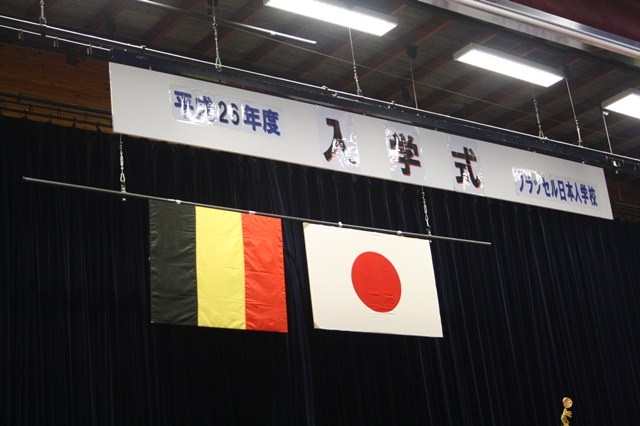 yomoyama_050_japaneseschool2The majority of these students are ‘double school’ children, attending local schools (in French, Dutch or German) or international schools (in English). In my congratulatory speech I mentioned two points; I wanted them to expand their circle of friends, persevering in Saturday school and I wanted them to brush up their multi-language communication skills. A week later, at the full-time school entrance ceremony, there were 41 enrolments in the elementary school and 26 enrolments in the middle school (last year, 44 and 19 respectively). As a result, the total number of students is exactly 300, a slight increase compared to last year. In this congratulatory speech I stressed the importance of “studying and playing very hard”. I think that creativity and concentration are the talents truly useful in adult life. Both at the full time and Saturday school, I hope that the children that have the opportunity to receive education in Brussels, in a foreign land, make the most of their time here. yomoyama_050_japaneseschool2The majority of these students are ‘double school’ children, attending local schools (in French, Dutch or German) or international schools (in English). In my congratulatory speech I mentioned two points; I wanted them to expand their circle of friends, persevering in Saturday school and I wanted them to brush up their multi-language communication skills. A week later, at the full-time school entrance ceremony, there were 41 enrolments in the elementary school and 26 enrolments in the middle school (last year, 44 and 19 respectively). As a result, the total number of students is exactly 300, a slight increase compared to last year. In this congratulatory speech I stressed the importance of “studying and playing very hard”. I think that creativity and concentration are the talents truly useful in adult life. Both at the full time and Saturday school, I hope that the children that have the opportunity to receive education in Brussels, in a foreign land, make the most of their time here.
<Chateau de Beloeil’s Historic Circle>
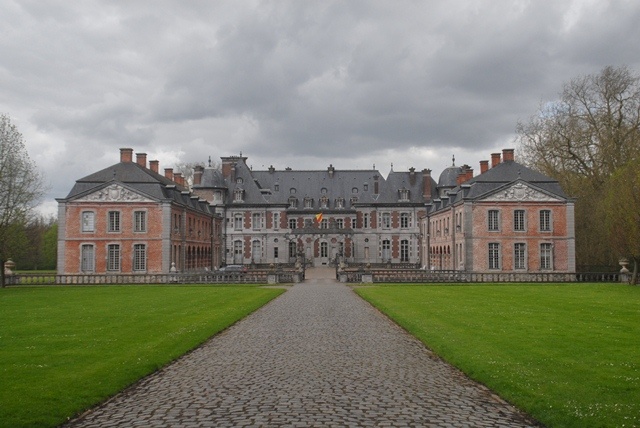 In comparison with its size of land, Belgium is the country with the most castles. In fact, wherever you go, you will be amazed by gorgeous castles. Last month, I received a dinner invitation for the ‘Historic Circle’ from the lord of the Castle of Beloeil, which is said to be one of the most famous castles. For a history buff like me, I truly had a great time. The Castle of Beloeil is located in a small village about 80km to the southwest of Brussels. The lord of the castle is Prince de Ligne. When Belgium became independent in 1830, this noble family’s name is said to have come up as a possible candidate for the king. The Castle of Beloeil, dating back to the 12th century, was transformed into the present beautiful residence in the 16th century and has undergone various reforms in the 17th and 18th century. In comparison with its size of land, Belgium is the country with the most castles. In fact, wherever you go, you will be amazed by gorgeous castles. Last month, I received a dinner invitation for the ‘Historic Circle’ from the lord of the Castle of Beloeil, which is said to be one of the most famous castles. For a history buff like me, I truly had a great time. The Castle of Beloeil is located in a small village about 80km to the southwest of Brussels. The lord of the castle is Prince de Ligne. When Belgium became independent in 1830, this noble family’s name is said to have come up as a possible candidate for the king. The Castle of Beloeil, dating back to the 12th century, was transformed into the present beautiful residence in the 16th century and has undergone various reforms in the 17th and 18th century. 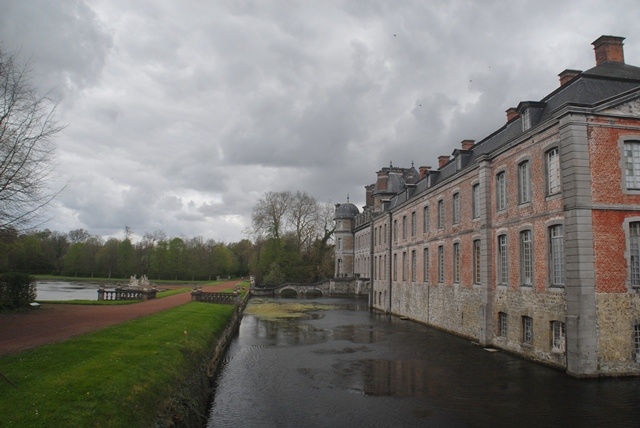 yomoyama_050_beloeil2The castle was hit by a big fire in 1900 and most of it was rebuilt 2 years later. The castle is also referred to as ‘Little Versailles’ and its vast French garden is definitely worth seeing. Charles-Joseph de Ligne, lord of the castle at the end of the 18th century, was known as a military man as well as a man of culture. He was close friends with Marie-Antoinette and Ecatherina the Great of Russia. Many of his belongings, reminiscent of a broad range of exchange in those days, are left in the library (given 3 stars in the Michelin travel guide). The ‘Historic Circle’ that was held the other day also took place in this library. The lecturer was the famous Stephan Bern and for more than one hour about 50 ladies and gentlemen listened to his lecture. It was an enjoyable evening full of “european culture” and it was late at night when I returned home after having had dinner together. yomoyama_050_beloeil2The castle was hit by a big fire in 1900 and most of it was rebuilt 2 years later. The castle is also referred to as ‘Little Versailles’ and its vast French garden is definitely worth seeing. Charles-Joseph de Ligne, lord of the castle at the end of the 18th century, was known as a military man as well as a man of culture. He was close friends with Marie-Antoinette and Ecatherina the Great of Russia. Many of his belongings, reminiscent of a broad range of exchange in those days, are left in the library (given 3 stars in the Michelin travel guide). The ‘Historic Circle’ that was held the other day also took place in this library. The lecturer was the famous Stephan Bern and for more than one hour about 50 ladies and gentlemen listened to his lecture. It was an enjoyable evening full of “european culture” and it was late at night when I returned home after having had dinner together.
|